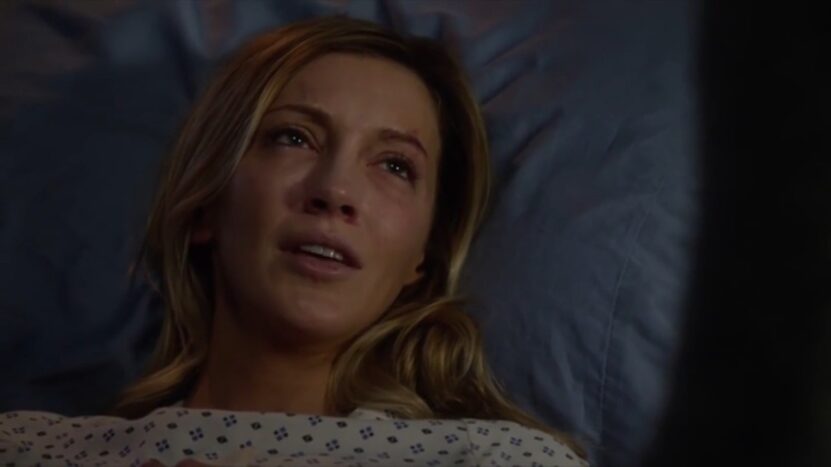Warning: Major spoilers ahead for the most recent episode of Arrow, “Eleven-Fifty-Nine
The Canary sang her last song this week on Arrow, as Laurel Lance was brutally murdered by Damien Darhk after the villain regained his mystic powers. While the episode itself was full of terrific performances, Katie Cassidy in particular, it certainly doesn’t offset the fact that killing off Laurel Lance was a bad move for Arrow.
Not everyone was a fan of Laurel, especially when her character was often set aside or went off the rails for the sake of plot convenience, but her role as Black Canary was essential to the Green Arrow mythos. Not only that, but her struggle to overcome trauma and addiction made her a compelling character when she was given a too rare chance to step into the spotlight.
Cassidy is already tapped to guest star on The Flash this season, so thankfully this won’t be the last we’ve seen of Laurel. However, the producers have been adamant that Laurel’s death is permanent, meaning we’ll only get to see her in time jumps and alternate universes.
As we begin the mourning process for one of DC’s iconic superheroes, here are a few reasons why Laurel’s death was a big mistake–and no, Olicity isn’t one of them.
Laurel’s Story Had so Much Untapped Potential Left
Laurel Lance had all the makings of an epic superhero origin story. She experienced real trauma in her life, first with the apparent death of her sister and cheating boyfriend, then a whirlwind of sudden deaths and reunions, leading to a serious alcohol addiction that she was forced to overcome.
Her work as ADA in a troubled city like Starling meant she was well aware that, as much as she hated to admit it, the justice system wasn’t always enough to overcome all the corruption in the world.
It was fantastic watching Laurel crawl her way up from the bottom to become the superhero fans always thought she could be. Unfortunately, once she grew into her mask, she quickly settled into her role as a supporting character, with little storyline of her own to work with.
Ultimately, her death not only felt unearned, she had almost no complicity in it, and will end up being another step in the ongoing narratives of Quentin Lance and John Diggle. There was so much more Laurel had left to do, far beyond being Oliver’s ex-girlfriend.
Would she find a way to advance her law career and keep wearing the mask? Could she find love again? Meet her own arch-nemesis? Find her own battles to fight? I guess we’ll never know.
While discussing the implications of the major character death, you might also be interested in our analysis of the relationship dynamics between Mike and Ginny in ‘Pitch’ and the reasons they didn’t need to cross certain boundaries.
We Can’t Afford to Lose More Female Superheroes

While it’s true that Supergirl has done wonders in proving that the television comic book world is by no means a “boys only” club, she can’t carry that burden all on her own. Black Canary is an iconic hero in the DC Universe, yet both Laurel, and her sister Sara before her, were reduced to plot devices to keep the story rolling. While Sara at least got a second chance in the Legends of Tomorrow ensemble, it’s doubtful Laurel will get that same opportunity.
Maybe we should have seen it coming. One of the more obnoxious elements of the Supergirl series premiere was the self-congratulatory way the writers repeated how great it was that there was “finally” a female superhero. Even they didn’t know that they had one all along.
The CW Really Can’t Afford to Offend More Fans
Anyone who thinks representation doesn’t matter hasn’t been following the fan outrage that’s been directed towards The CW over the last month, largely thanks to two major character deaths on The 100. It’s becoming increasingly hard to endure the deaths of so many minorities, especially when writers and producers continue to justify it as an important part of the overarching narrative.
It’s understandably painful for audiences to see their TV heroes, the character that they resonate with, be reduced to stepping stones for the protagonist to cross in order to keep the story moving. Laurel and the Black Canary meant something to fans and her death has far more significance than Oliver losing his ex-girlfriend, even if the producers haven’t quite figured that out yet.
It Reduced Her to A Love Interest
For reasons unknown to me, there are so many shows out there that simply don’t know what to do with their female characters if they don’t have a love interest. In the case of Laurel, once Tommy was gone and it became clear any romantic future she had with Oliver was out of the picture, it felt like the writers had no idea what to do with her.
Even worse, her final moments in the show had her professing that Oliver was the love of her life, in spite of the fact that she’s not the love of his. I’m sorry, but what? He was a terrible boyfriend who constantly cheated on her, including with her own sister. To have those be her final words may be the biggest miscalculation of how Laurel was treated throughout the show, which is saying a lot.
It Was the Easy Way Out
At the end of the day, killing Laurel was an easy solution to a problem the Arrow team wrote themselves into. The start of the season promised a shocking death that they had to deliver, in spite of the fact that by Season 4 essentially all of the main characters maintained “untouchable” status.
Except that, out of all the main characters, Laurel still had the least impact on the story. This way they could kill two birds with one stone–create a real shock value death that won’t completely derail the show and get rid of a character they had no idea what to do with.
The immediate backlash is proof enough that fans and critics alike have easily recognized the cop-out. It’s too early to say what effect Laurel’s death will have in the long term for Arrow, but from where I’m standing it was a mistake simply too big to ignore.
You may also want to read about how Dominique Provost-Chalkley’s role in ‘Season of Love‘ helped her confront her personal fears in our insightful article.
Arrow airs Wednesdays at 8 p.m. ET on CTV and The CW.




